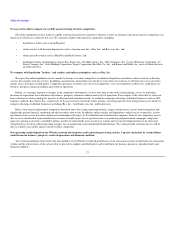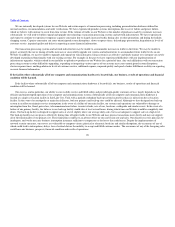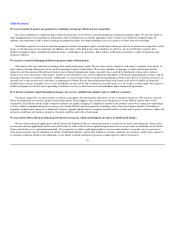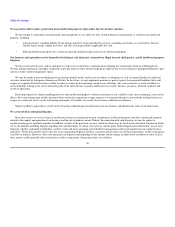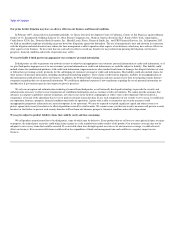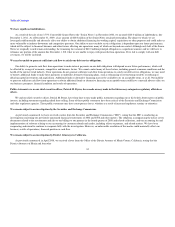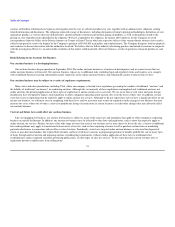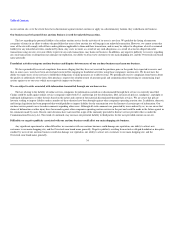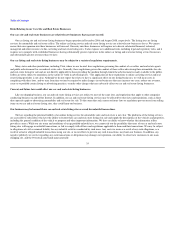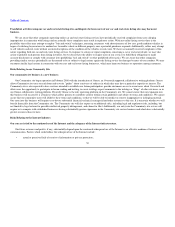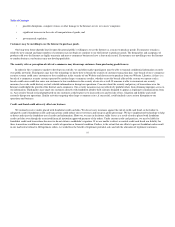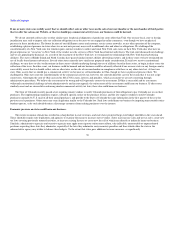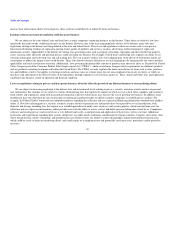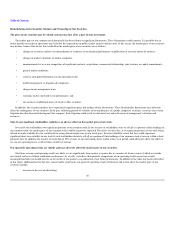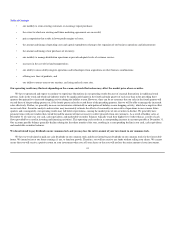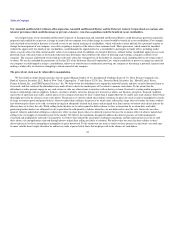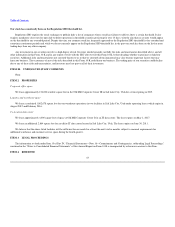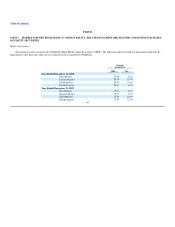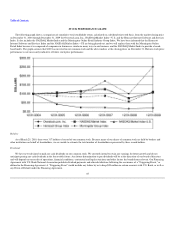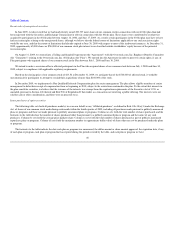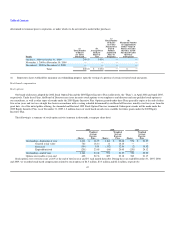Overstock.com 2009 Annual Report Download - page 40
Download and view the complete annual report
Please find page 40 of the 2009 Overstock.com annual report below. You can navigate through the pages in the report by either clicking on the pages listed below, or by using the keyword search tool below to find specific information within the annual report.
Table of Contents
possible disruptions, computer viruses or other damage to the Internet servers or to users' computers;
significant increases in the costs of transportation of goods; and
governmental regulation.
Customers may be unwilling to use the Internet to purchase goods.
Our long-term future depends heavily upon the general public's willingness to use the Internet as a means to purchase goods. E-commerce remains a
relatively new concept and large numbers of customers may not begin or continue to use the Internet to purchase goods. The demand for and acceptance of
products sold over the Internet are highly uncertain and most e-commerce businesses have a short track record. If consumers are unwilling to use the Internet
to conduct business, our business may not develop profitably.
The security risks or perception of risks of e-commerce may discourage customers from purchasing goods from us.
In order for the e-commerce market to develop successfully, we and other market participants must be able to transmit confidential information securely
over public networks. Third parties may have the technology or know-how to breach the security of customer transaction data. Any breach of our e-commerce
security systems could cause customers to lose confidence in the security of our Website and choose not to purchase from our Website. Likewise, if there is a
breach of e-commerce security systems operated by another large e-commerce retailer, whether or not the breach affected the systems we operate such a
breach could cause could also cause our customers to lose confidence in the security of our site as well. If someone is able to circumvent our security
measures, he or she could destroy or steal valuable information or disrupt our operations. Concerns about the security and privacy of transactions over the
Internet could inhibit the growth of the Internet and e-commerce. Our security measures may not effectively prohibit others from obtaining improper access to
our information. Third parties may target our customers directly with fraudulent identity theft schemes designed to appear as legitimate communications from
us. Any security breach or fraud perpetrated on our customers could expose us to increased costs and to risks of loss, litigation and liability and could
seriously disrupt our operations. Similar activities targeting other large e-commerce sites, if successful, could similarly cause serious disruption to our
operations and business.
Credit card fraud could adversely affect our business.
We routinely receive orders placed with fraudulent credit card data. We do not carry insurance against the risk of credit card fraud, so the failure to
adequately control fraudulent credit card transactions could reduce our net revenues and our gross profit percentage. We have implemented technology to help
us detect and reject the fraudulent use of credit card information. However, we may in the future suffer losses as a result of orders placed with fraudulent
credit card data even though the associated financial institution approved payment of the orders. Under current credit card practices, we may be liable for
fraudulent credit card transactions because we do not obtain a cardholder's signature. If we are unable to detect or control credit card fraud, our liability for
these transactions could harm our business, results of operation or financial condition. Further, to the extent that our efforts to prevent fraudulent orders result
in our inadvertent refusal to fill legitimate orders, we would lose the benefit of legitimate potential sales and risk the alienation of legitimate customers.
37
•
•
•


